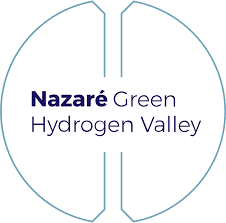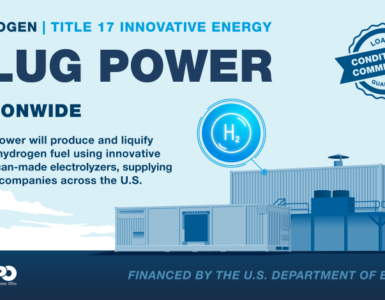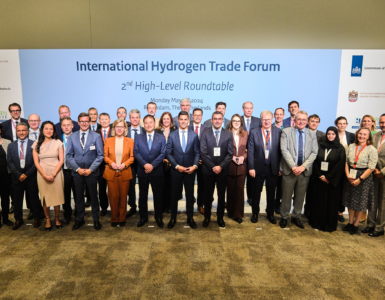Nazaré Green Hydrogen Valley – ground-breaking decarbonization consortium set to launch in Portugal.
Nazaré Green Hydrogen Valley (NGHV) consortium is set to unite leading industrial players in Portugal’s central region of Marinha Grande. The consortium plans to put forward an innovative decarbonization plan though the use of green hydrogen.
The project titled “Nazaré Green Hydrogen Valley” represents 10% of CO2 emissions within whole industrial sector of Portugal, thus having a strong impact on sector sustainability, exports and communities.
The consortium is already replicating this approach in other areas nationwide.
🔥 What about we co-host a webinar? Let's educate, captivate, and convert the hydrogen economy!
Hydrogen Central is the global go-to online magazine for the hydrogen economy, we can help you host impactful webinars that become a global reference on your topic and are an evergreen source of leads. Click here to request more details
NGHV brings together five energy intensive leading companies in industrial segments such as glass and cement markets operating in the central region of Marinha Grande, Leiria and Coimbra.
The consortium is set to revolutionize the way the Portuguese industrial sector approaches decarbonization through mature and scalable technology.
It will lead the transition to cleaner energy produced from renewable sources such as solar energy, using circular economy practices through the use of wastewater.
By decarbonizing these companies, NGHV will cut a significant share of total carbon industry emissions nationwide.
Consortium strengthens foreign investment and national industry The consortium, led by REGA ENERGY, comprises leading businesses across industry including Águas do Centro Litoral, BA Glass, Cimpor, Crisal, GGND (Galp Gas Natural Distribuição), Secil and Vidrala.
NGHV includes technology and R&D centers such as C5Lab, Technology Centre of Ceramics and Glass (CTCV), the Portuguese Hydrogen Association (P2 H2 Association) in addition to other partners, such as Fusion Fuel and Madoqua Ventures.
REGA ENERGY is a leading independent renewable gas producer based in Portugal bringing know-how and experience in the hydrogen industry to the domestic market.
The team is staffed with experienced Portuguese engineers and business developers versed in energy. Its activities will generate the creation of highly qualified jobs and teams to build out this nascent industry.
NGHV’s initial investment is estimated at over 100 EUR million, expected to scale up over time. By 2025, the consortium will employ over 1700 people, out of which 140 roles will be entirely new.
Thomas Carrier, CEO of REGA ENERGY.
Portugal can become a European powerhouse for the low carbon industry through its renewable resources, exporting low carbon premium products and new sector industries.
“Sobriety, recycling, efficiency, electrification is not sufficient for heavy industries to reach carbon neutrality. This is where green hydrogen comes into play, for deep decarbonization. Nazaré Green Hydrogen Valley project can set the beginning of the decarbonization path for Portugal’s industry. We look forward to scaling it to multiple industrial regions in the country”.
Otmar Hübscher and Luis Fernandes, respectively leading SECIL and CIMPOR, said:
the consortium sets a milestone for industry competitiveness through the production of green hydrogen.
“It can contribute decisively to achieve carbon neutral and sustainability goals by 2050 for both companies”.
The project is supported by the glass industry “through the consortium effort we want to endeavour Marinha Grande’s 300 years legacy in the glass industry.
Glass must be carbon neutral to bring full value to society and a more circular economy.
Glass plants cannot electrify the entirety of its energy needs, and we see NGHV delivering the compelling complementary solution glass needs though the supply of Green Hydrogen and Green Oxygen” according to BA Glass, Vidrala and Crisal Managers’, respectively Reinaldo Coelho, Carlos Barranha and Carlos Viegas, who perceive this initiative as a unique opportunity to step forward in decarbonization.
Business plan: low carbon and price stability NGHV is a large-scale project set to bring strategic advantage to energy intensive players and consumers, through decarbonization and long-term energy price stability.
Energy cost predictability can offer better energy resilience domestically while adding to the country’s societal stability and long-term job attractiveness.
In heavy industry, there is no electrification technology available to ensure deep decarbonization. Such is the case for steel, cement, glass, fertilizers and ceramics.
Export businesses in Portugal will ensure the production of low carbon products, contributing to the export of value-added products with renewable energy, made in Portugal.
Where renewable gas is not used by consortium customers, it can be injected in the natural gas network through indirect green hydrogen purchase agreement contracts, allowing other industrial companies to benefit from these contracts to compensate their emissions resulting from fossil energy consumption.
Project implementation
“Nazaré Green Hydrogen Valley” consortium expects to start implementing the project physical infrastructure by 2023, with operations set to begin by the end of 2025, subject to public financial support. Infrastructure will include a dedicated network including a solar plant producing renewable energy and supplying hydrogen.
Nazaré Green Hydrogen Valley in numbers
Consortium investment is estimated at over 100 EUR million aimed at industry retrofit to become carbon neutral. In parallel, the consortium will develop an installed capacity of 40MW, with an anticipated extension of up 600MW.
This can make NGHV one of the relevant projects for green hydrogen production, driven by the industry need for decarbonization. The consortium represents more than 1Mt CO2 of emissions per year, an estimated 10% of national industry total CO2 emissions equivalent or Portugal’s 2.5% total CO2 emissions. Thanks for staying up to date with Hydrogen Central.
A future project: innovative, technological, and circular economy Decarbonization is a business imperative and requires action with a sustainable and reliable strategy, using circular economy practices whenever possible.
This is the largest scale project of this nature to be launched in Portugal set to be replicated across the country as a mean to support businesses in meeting EU’s ambitious environmental targets. It can also help promote better conditions for regional job preservation and specialization.
This national project is aligned with the EU’s transition, supportive of a twin digital and green agenda for Portugal.
READ the latest news shaping the hydrogen market at Hydrogen Central
GROUND-BREAKING DECARBONIZATION CONSORTIUM SET TO LAUNCH IN PORTUGAL, February 22, 2022








